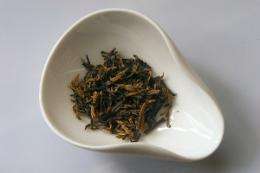Fruit and veg flavanoids give cardioprotective effects

A study published in the journal of Biochemical Pharmacology suggests major flavonoid quercetin is beneficial in reducing the risk of cardiovascular disease (CVD).
The study highlights the cardioprotective effects certain dietary flavonoids have when consumed as part of a normal diet.
Study supervisors Medical Research Foundation and UWA research fellow Natalie Ward and UWA School of Medicine and Pharmacology professorial fellow Kevin Croft say quercetin is one of the most widely abundant flavonoids in the diet.
"This study was a preliminary study in cells and isolated mouse vessels, so more work is still needed to ascertain the beneficial effects of quercetin against CVD," Dr Ward and Prof Croft say.
"However our findings have suggested that quercetin is able to protect vessels against oxidant induced damage."
According to the study, flavonoids are metabolised rapidly by methylation or glucuronidation after ingestion, which can alter their biological activity.
The effects of quercetin on endothelial cell functions are in part mediated via adenosine monophosphate-activated protein kinase (AMPK), a key enzyme in cellular energy homeostasis that affects fatty acid oxidation.
"AMPK is a cellular energy sensor that responds to stress situations and potentially protect the cell from damage," Dr Ward and Prof Croft say.
"It is present in a number of cell types and is thought to be involved in numerous signalling pathways.
"At this stage the exact mechanism for how quercetin and other flavonoids affect AMPK is unclear, although it is thought to be in part, through increased phosphorylation at important activation sites."
The study found that quercetin and its metabolites can induce activation of AMPK and eNOS in human aortic endothelial cells, and lead to an increase in the concentrations of S-nitrosothiols and nitrite in cell culture media.
"S-nitrosothiols and nitrite are indices of nitric oxide production by the cell," Dr Ward and Prof Croft say.
"Nitric oxide is an important vasodilator that is required for the normal function of blood vessels."
Dr Ward and Prof Croft say quercetin also works to protect vessels against hypochlorous acid-induced endothelial dysfunction in isolated arteries.
"We believe [quercetin] works by upregulating Heme-oxygenase which is an antioxidant enzyme that can then protect the vessels against oxidant induced damage."
The supervisors say there is evidence to suggest that other dietary flavonoids may reduce blood pressure as well as attenuate the development of atherosclerosis.
"Future studies looking at the affect of flavonoids on CVD should consider using combinations of flavonoids, as well as dietary sources of flavonoids, rather than supplementation with pure flavonoids," they say.
"Also, long-term studies in humans to confirm the beneficial effects seen in short-term or acute studies.
"This would help to support the well known cardiovascular benefits of eating a diet rich in fruits and vegetables."
















